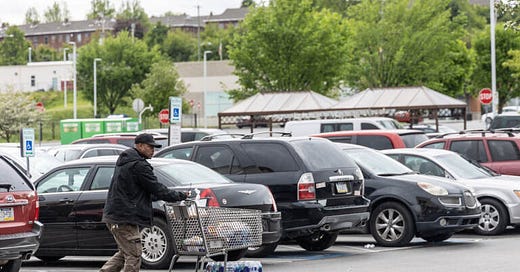Philadelphia's Tap Water Has a Trust Problem
WHYY: How much did the recent contamination scare make it worse? Before a chemical spill threatened to contaminate Philly’s water, 42 percent of residents drank bottled water.
From WHYY Plan Philly …
“Tap water is not even in our vocabulary,” Walker said. “We use that for cleaning, that’s it. … But as far as consumption — that’s not happening. My whole family don’t do it. That was passed down from my grandfather.”
Walker is one of an estimated more than 600,000 Philadelphians who opt to drink bottled water rather than water that comes from the tap, despite the fact that the city says its water meets health and safety standards. The recent water contamination scare — caused by an upstream chemical spill in late March that, according to the Philadelphia Water Department, did not end up entering Philly’s water system — probably did not help change their minds.
City officials painted their communications around the spill, which included a mobile alert recommending residents drink bottled water after a certain time “out of an abundance of caution,” as an effort to be proactive and transparent.
“Knowing it’s very low risk, but knowing that we can’t say it’s zero risk — that felt important to share,” Philadelphia Health Commissioner Dr. Cheryl Bettigole said at the time.
But some worry the incident could further entrench distrust of the city’s water, or cause more people to switch from drinking tap water to bottled water.
Charles Ellison, managing editor of ecoWURD and a 2023 Emerson Collective fellow, thinks the city needs to go further. He found the city’s communication during the contamination scare this spring too casual and robotic — and thinks the incident “will make those trust levels worse.”
“You’ve got to do more than just press conferences,” he said.
The city should still be talking about the contamination scare, Ellison said, engaging directly with residents through neighborhood forums and partnerships with community leaders and independent experts. In order to build trust in the tap water in general, Ellison said, the city should engage with young people and give residents real decision-making power over improvements to the water infrastructure.
Once trust is lost, it’s hard to gain back, said Teodoro, of the University of Wisconsin-Madison.
“It’s almost a one-way street,” he said. “Once people abandon tap water in favor of the commercial alternative, it’s hard to get them to go back. We have survey data that suggests if people have ever experienced a serious problem with their tap water, they just drink bottled water the rest of their lives.”



